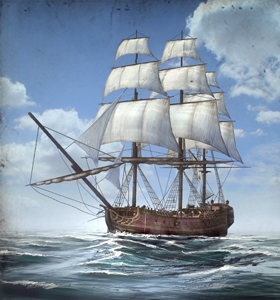Difference between revisions of "Merchantman (NTW Unit)"
m (moved Merchantmen (Trade Ship) to Merchantmen (NTW Unit): Correcting page title to conform with the system that is being used.) |
m (Quick-adding category "NTW Unit" (using HotCat)) |
||
| Line 6: | Line 6: | ||
British merchant trading was the strongest in the world during the Napoleonic era, and this position was protected by the Navigation Acts first passed in 1651. Trade with British colonies had to be carried out using “British bottoms” or British ships, not to mention British ports and mainly British crews, effectively squeezing out any competition. Other nations tried similar protectionist policies, but without as much success. Despite this legal help, British merchant owners were not without their difficulties; the Royal Navy used press gangs to recruit seamen for the ranks and experienced merchant sailors were the first to be targeted, forcing merchant owners to pay high wages for less able seamen simply to run their ships. | British merchant trading was the strongest in the world during the Napoleonic era, and this position was protected by the Navigation Acts first passed in 1651. Trade with British colonies had to be carried out using “British bottoms” or British ships, not to mention British ports and mainly British crews, effectively squeezing out any competition. Other nations tried similar protectionist policies, but without as much success. Despite this legal help, British merchant owners were not without their difficulties; the Royal Navy used press gangs to recruit seamen for the ranks and experienced merchant sailors were the first to be targeted, forcing merchant owners to pay high wages for less able seamen simply to run their ships. | ||
| + | |||
| + | [[Category:NTW Unit]] | ||
Revision as of 11:51, 1 January 2011
Overview
This trade ship is neither blessed with speed nor firepower and can be outmanoeuvred by most naval vessels. It is built for trade, and its low upkeep costs mean a large profit from each journey. If trapped it can defend itself slightly and maybe even drive off very weak attackers, but merchants are not fighting men, and their low morale and the ship’s light guns are unlikely to last long against a real warship.
British merchant trading was the strongest in the world during the Napoleonic era, and this position was protected by the Navigation Acts first passed in 1651. Trade with British colonies had to be carried out using “British bottoms” or British ships, not to mention British ports and mainly British crews, effectively squeezing out any competition. Other nations tried similar protectionist policies, but without as much success. Despite this legal help, British merchant owners were not without their difficulties; the Royal Navy used press gangs to recruit seamen for the ranks and experienced merchant sailors were the first to be targeted, forcing merchant owners to pay high wages for less able seamen simply to run their ships.
